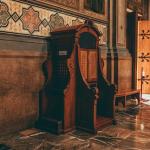Are imprecatory prayers appropriate for the children of Abraham? If so, then they are appropriate for us, for Paul says in Galatians that we are all “sons of God through faith in Christ Jesus,” and that if we “belong to Christ, then you are Abraham’s seed, heirs according to promise.” Are imprecatory prayers appropriate for the anointed one? If so, they are appropriate for us, since we are all anointed in the Anointed one, christs in the Christ. Are they... Read more




















